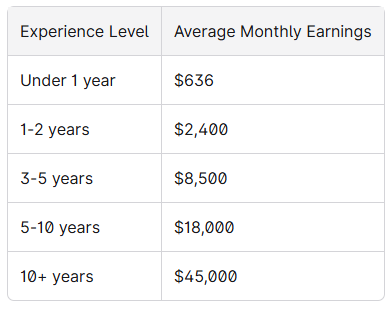With the global affiliate marketing industry valued at $18.5 billion in 2025, one question dominates discussions among digital entrepreneurs and marketers: Is the affiliate marketing business model still profitable? The short answer is a resounding yes! The affiliate market is projected to continue its rapid growth, but the landscape has evolved dramatically, requiring new strategies and approaches.
The industry has transformed from a niche digital strategy into a mainstream channel that influences roughly 16% of all US e-commerce sales. As we dive deep into 2025’s market dynamics, this comprehensive analysis will examine the current profitability landscape, reveal the highest-earning opportunities, and provide actionable insights for both newcomers and experienced affiliate marketers looking to maximize their affiliate income.
Affiliate marketing growth is being fueled by regional expansion, with emerging markets in Latin America and Asia-Pacific driving industry development and increased adoption of affiliate strategies worldwide.
Whether you’re considering whether to start affiliate marketing or you’re a seasoned professional evaluating your marketing strategy for the year ahead, understanding the current profitability metrics and market trends is crucial for making informed decisions about your affiliate marketing.
Last, if you are simply wondering, "is affiliate marketing worth it?" we hope to persuade you — it certainly is! And should you start, you shouldn't have to wait to long to see results!
Introduction to Affiliate Marketing

The global affiliate marketing industry has experienced remarkable growth, with over 80% of brands now utilizing affiliate marketing programs to expand their reach and boost revenue. In 2025, the industry is projected to reach $12 billion in the US alone, while the worldwide market is valued at more than $18.5 billion. This surge reflects the increasing reliance on affiliate marketers to promote products, generate leads, and convert prospects into loyal customers. For businesses seeking scalable, cost-effective marketing solutions, affiliate marketing remains a powerful tool for driving growth and engaging new audiences.
Benefits of Affiliate Marketing
Affiliate marketing offers a wealth of benefits for both businesses and affiliate marketers, making it one of the most attractive online marketing channels today. For businesses, affiliate marketing provides a cost-effective way to reach new audiences and increase sales, as commissions are only paid when a sale or desired action occurs. This performance-driven approach allows companies to maximize their marketing efforts and track the effectiveness of each campaign with precision.
Successful affiliate marketers can achieve substantial earnings, with some generating up to $100,000 per month through strategic promotion and audience engagement. The flexibility of affiliate marketing is another major advantage — affiliate marketers can work from anywhere, set their own schedules, and choose which products to promote.
The Role of the Affiliate Marketer

The affiliate marketer plays a pivotal role in the affiliate marketing ecosystem, acting as the bridge between businesses and their target audience. To succeed, affiliate marketers invest both time and money. They employ a variety of marketing strategies, including social media marketing, content marketing, and email campaigns, to promote products and drive sales.
Staying ahead in the affiliate game requires continuous learning and adaptation. Affiliate marketers must keep up with the latest affiliate marketing trends, such as optimizing their websites for mobile devices, leveraging voice search optimization, and experimenting with new content formats. By consistently providing value and maintaining authenticity, affiliate marketers can cultivate loyal audiences and achieve long-term success in an increasingly competitive landscape.
Executive Summary & Profitability Assessment of the Affiliate Marketing Industry
Yes, affiliate marketing remains highly profitable in 2025. The numbers speak for themselves: businesses earn an average of $15 for every $1 spent on affiliate marketing programs, representing an impressive 1,400% return on investment. This remarkable ROAS (Return on Ad Spend) of 12:1 significantly outpaces traditional digital marketing strategies like paid search and social media advertising. For this reason, brand marketers increasingly view affiliate marketing as the most successful marketing channel for driving online sales and maximizing revenue.
The market adoption statistics reveal the mainstream acceptance of affiliate marketing as a successful marketing channel:
- 81% of brands actively participate in affiliate programs
- 84% of publishers monetize through affiliate partnerships
- 65% of retailers report that affiliate marketing contributes 10-20% of their annual revenue
- 80% of global brands now leverage affiliate marketing in some capacity
- Major brands rely heavily on affiliate marketing programs to drive sales, acquire new customers, and enhance their digital marketing strategies.
Brand marketers are increasingly allocating more budget to affiliate marketing due to its proven profitability and its status as the most successful marketing channel for generating online sales.
For individual affiliate marketers, the earning potential remains robust. The average affiliate marketer can earn between $8,000-$10,000 monthly, while top performers in high-paying niches exceed $150,000 annually. These figures represent affiliate marketers who treat their affiliate marketing business as a serious venture rather than a side hustle.
The affiliate marketing analytics reveal strong fundamentals:
- Conversion rates typically range from 1-2%, with successful affiliate marketers achieving 5-10%
- Earnings per 1,000 visitors average $274, which is 16% higher than other digital revenue models
- Customer retention from affiliate-referred customers shows a 21% higher repeat purchase rate
The market size continues its upward trajectory, with projections indicating growth from the current $18.5 billion to over $31 billion by 2031. The US affiliate marketing spending alone is projected to reach $12-16 billion between 2025-2028, representing consistent double-digit annual growth.
Affiliate Marketing Revenue Models & Earning Potential

Understanding the diverse revenue models within affiliate marketing is crucial for maximizing profitability. Different affiliate programs offer varying commission structures, and choosing the right mix can significantly impact your affiliate revenue. High paying affiliate programs can provide greater earning potential, so it's essential to evaluate each affiliate marketing program carefully to ensure you select the best opportunities for maximizing your earnings.
High-Paying Niches Breakdown
The most lucrative affiliate marketing programs cluster around specific verticals:
Software as a Service (SaaS)
- Commission range: 20-70% of monthly subscription fees
- Recurring commission model provides compound growth over time
- Average monthly earnings for successful SaaS affiliate marketers: $15,000-$45,000
Health and Wellness
- Average commission rate: 15% (Digistore24 health offers can be 80%+)
- Supplement and fitness programs often offer 60-80% commissions
- Growing market with consistent consumer demand
Geographic Earning Variations
The global affiliate marketing industry shows significant geographic disparities in earning potential:
North America Market
- Dominates with 40% of global market share
- Higher conversion rates due to established e-commerce infrastructure
- US spending projected to reach $12-16 billion by 2025-2028
European and Asia-Pacific Markets
- Rapid growth in mobile affiliate marketing
- Emerging opportunities in local affiliate networks
- Lower competition in many niche markets
Experience-Based Earnings Analysis
The correlation between experience and affiliate income shows clear patterns:

The recurring commission models in subscription-based industries provide the most stable income streams. Many affiliate marketers focus on promoting products with monthly recurring billing to build predictable affiliate revenue.
Technology & AI Impact on Profitability

The integration of artificial intelligence and advanced technology has revolutionized affiliate marketing, creating new opportunities for profit optimization while reducing operational costs. Marketers utilize affiliate marketing tools and AI to optimize their strategies and effectively reach consumers at different stages of the customer journey.
AI Adoption and Performance Improvements
The latest affiliate marketing statistics show widespread AI adoption:
- 79.3% of affiliate marketers actively use AI tools for content creation and optimization
- AI-driven strategies increase click-through rates by 40%
- Sales conversion improvements of 30% through AI-powered targeting and personalization
Smart affiliates leverage AI across multiple functions:
Content Creation and SEO
- Automated blog post generation for affiliate content
- Keyword research and search engine optimization
- Product review creation at scale
Data Analysis and Optimization
- Real-time performance tracking across affiliate campaigns
- Predictive analytics for identifying high-converting affiliate links
- A/B testing automation for landing pages and referral links
Mobile-First Transformation
Mobile devices now drive the majority of affiliate traffic:
- 50-62% of affiliate traffic originates from mobile devices
- 45% growth in mobile affiliate purchases over the past two years
- Mobile-optimized affiliate sites show 65% higher conversion rates
A well-designed affiliate site is crucial for ensuring a positive user experience and maximizing conversions on mobile devices. Successful strategies now prioritize mobile-responsive design, fast loading times, and thumb-friendly navigation for affiliate websites.
Tracking Evolution and Attribution
The affiliate marketing landscape has adapted to privacy changes:
- 70% of affiliate platforms have transitioned to cookieless, server-side tracking
- Multi-touch attribution models provide more accurate commission tracking
- First-party data strategies help maintain tracking accuracy while respecting data protection laws
These technological advances reduce operational costs while improving conversion rates, directly impacting the profitability of affiliate business models.
Market Challenges & Profitability Risks

While affiliate approaches remain profitable, several challenges threaten margins and success rates for both newcomers and established affiliate marketers. Let's look at a few.
Competition Intensification
The maturation of the affiliate space has led to increased competition:
- 38% of affiliate marketers struggle with low conversion rates due to market saturation
- High-quality content requirements have raised barriers to entry
The average affiliate marketer faces stiffer competition for:
- Premium affiliate program partnerships, where successful affiliates leverage mobile-optimized content, video marketing, and strategic partnerships to stand out in a crowded market
- Search engine ranking positions
- Social media audience attention
- High-converting affiliate traffic sources
Rising Advertising Costs
Paid advertising, a crucial traffic source for many affiliate marketers, has become more expensive:
- Google Ads costs have increased 15-20% year-over-year in competitive niches
- Facebook advertising costs continue rising, particularly for affiliate content
- Cost per click (CPC) rates in finance and health niches often exceed $10-15
These rising costs directly impact the profitability calculation for affiliate marketing efforts that rely on paid ads to generate affiliate traffic.
Algorithm Dependencies and Volatility
Search engine algorithm updates present ongoing risks:
- 25.1% of marketers report negative impacts from recent Google algorithm updates
- Organic traffic volatility can devastate affiliate marketing revenue overnight
- Platform policy changes on social media can eliminate established traffic sources
Many affiliate marketers have experienced significant income fluctuations due to algorithm changes, highlighting the importance of diversified traffic sources for sustainable affiliate marketing success.
Consumer Trust and Compliance Issues
Growing consumer awareness creates new challenges:
- 49% of consumers express skepticism about affiliate recommendations
- FTC enforcement requires transparent disclosures that may impact conversion rates
- Affiliate fraud concerns lead to stricter vetting by affiliate networks
Traffic Generation Obstacles
The most significant barrier to affiliate marketing profitability remains traffic generation:
- 45.3% of affiliate marketers cite generating traffic as their biggest obstacle
- Organic search competition has intensified across most profitable niches
- Social media reach continues declining without paid promotion
Affiliate Fraud Prevention
As the affiliate marketing industry continues to grow, so does the risk of affiliate fraud — a challenge that can undermine trust and profitability for all stakeholders. Affiliate fraud occurs when unscrupulous affiliate marketers use deceptive tactics, such as cookie stuffing or generating fake referrals, to illegitimately earn commissions. In 2022 alone, affiliate fraud was estimated to cost the industry over $3.4 billion.
To combat this, businesses and affiliate networks have implemented advanced tracking and monitoring systems designed to detect and prevent fraudulent activity. These measures include real-time analytics, strict vetting processes, and compliance with regulatory guidelines such as those set by the Federal Trade Commission (FTC). For affiliate marketers, adhering to ethical standards and transparent practices is essential to maintaining credibility and long-term partnerships. By prioritizing fraud prevention, affiliates can safeguard the reputation of their industry and continue to provide a valuable, trustworthy marketing channel for both businesses and affiliate marketers.
Platform Opportunities & Consumer Behavior

Despite challenges, new platform opportunities and evolving consumer behavior patterns create fresh avenues for affiliates. Creating and optimizing affiliate accounts is essential to capitalize on these emerging platforms and maximize profitability.
Social Commerce Growth
Social media platforms have evolved into powerful affiliate channels:
Instagram Shopping Integration
- Shoppable posts allow direct product purchases through affiliate links
- Story swipe-ups (now link stickers) provide seamless customer journeys
- Instagram Reels featuring product demonstrations show higher engagement rates
- The growing importance of user generated content on Instagram helps brands build trust and drive engagement, making affiliate marketing more effective.
TikTok Affiliate Opportunities
- TikTok Shop integration enables direct affiliate sales
- Short-form video content generates twice the engagement of traditional formats
- Younger demographics show higher trust in influencer and affiliate recommendations
- Brands increasingly leverage user generated content on TikTok to boost brand awareness and improve conversion rates.
YouTube Affiliate Evolution
- YouTube Shorts compete with TikTok for affiliate content
- Long-form product reviews maintain strong search visibility
- Community tab features enable ongoing audience engagement
Video Content ROI
Video content consistently outperforms traditional affiliate content:
- Short-form videos generate 2x higher engagement than static content
- Product demonstration videos show 40% higher conversion rates
- Live streaming affiliate promotions create urgency and boost sales
Creating content specifically tailored for video platforms is essential to maximize affiliate ROI, as it helps attract and retain audiences more effectively.
The best affiliate marketers increasingly invest in video creation tools and skills to capitalize on this trend.
Consumer Trust and Purchasing Behavior

Understanding consumer behavior patterns helps optimize affiliate strategies:
Trust Metrics
- 50% of consumers trust affiliate recommendations as much as personal referrals
- 74% of buyers visit multiple sites before purchasing through affiliate links
- Authentic product experiences in affiliate content increase conversion probability
Purchase Journey Analytics
- Average of 7 touchpoints before affiliate conversion
- Cross-device purchasing requires sophisticated referral link tracking
- Review aggregation influences 89% of affiliate-driven purchases
Platform Diversification Success
The most successful affiliate ventures diversify across multiple platforms:
Reddit Marketing
- Product recommendation threads generate high-quality affiliate traffic
- Subreddit-specific content targets niche audiences effectively
- Long-form discussions provide context for affiliate links
Email Marketing Integration
- Email lists provide direct access to engaged audiences (use email integrations on Digistore24!)
- Newsletter recommendations show 25% higher conversion rates than social media
- Automated email sequences nurture affiliate prospects over time
Podcast Affiliate Opportunities
- Sponsored segments in podcasts generate premium affiliate commissions
- Host-read endorsements create authentic affiliate content
- Podcast-specific discount codes enable accurate tracking
Future Profitability Outlook & Strategic Recommendations
The affiliate marketing industry’s trajectory through 2031 suggests continued growth and profitability, but success will require strategic adaptation to emerging trends and technologies. Developing a comprehensive affiliate strategy that leverages multiple channels — such as blogs, social media, and video content — is essential to effectively reach and build trust with your target audience throughout their shopping journey.
Growth Projections and Market Evolution
Industry forecasts paint an optimistic picture for the affiliate marketing business model:
- Market size expansion from $18.5 billion (2025) to $44-48 billion by 2031
- 90% of e-commerce businesses expected to adopt affiliate marketing by 2026
- 15.2% compound annual growth rate (CAGR) projected through the next decade
The global industry shows particular strength in:
- Cross-border e-commerce affiliate programs
- Subscription economy recurring commission models
- B2B SaaS affiliate partnerships with enterprise-level commissions
Technology Integration Requirements
To maintain profitability, affiliate marketers must embrace technological advancement:
AI Tool Integration
- Content creation automation while maintaining authenticity and brand voice
- Predictive analytics for identifying trending products before market saturation
- Automated optimization of affiliate campaigns across multiple channels
Mobile-First Strategy Implementation
- Progressive web app development for affiliate websites
- Mobile payment integration to reduce friction in affiliate sales
- Voice search optimization for emerging search behaviors
Strategic Imperatives for 2025 and Beyond
Based on current affiliate marketing trends and projected market evolution, successful affiliate marketing strategies should focus on:
Niche Expertise Development Rather than attempting to promote products across multiple verticals, resourceful affiliate marketers increasingly specialize in specific niches where they can establish authority and trust. This approach leads to:
- Higher conversion rates due to audience trust
- Better relationships with affiliate managers
- Premium commission opportunities for proven experts
Quality Over Quantity Approach The days of mass-produced, low-quality affiliate content are ending. High earning affiliate marketers focus on:
- Comprehensive product comparisons and reviews
- Original testing and user experience documentation
- Long-form content that addresses complete customer journeys
Technology Adoption Balance While AI tools offer efficiency gains, maintaining authenticity remains crucial:
- Use AI for research and optimization, not complete content replacement
- Invest in genuine product experience and testing
- Create content that provides unique value beyond what competitors offer
Final Verdict: Highly Profitable with Strategic Requirements

The affiliate marketing business model remains highly profitable in 2025, but success requires more sophistication than in previous years. The barrier to entry has risen, but so have the potential rewards for those willing to invest in proper education, tools, and strategies.
The affiliate industry will continue evolving, but its fundamental value proposition — connecting consumers with relevant products through trusted recommendations — ensures its profitability for those who approach it strategically. Success in 2025 and beyond belongs to those who combine technological efficiency with authentic value creation, building sustainable affiliate businesses that serve both audiences and brand partners effectively.
Last, is affiliate marketing worth it? The above should make it clear that, whether you’re evaluating affiliate campaigns as a primary income source or considering how affiliate programs fit into your broader marketing strategy, the data clearly supports a Yes!


